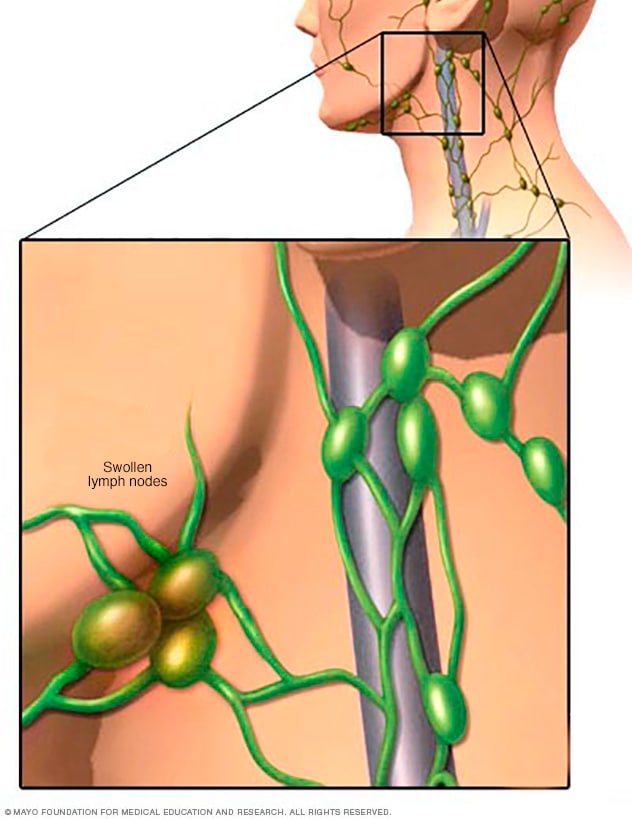Overview
Parts of the immune system

Parts of the immune system
The lymphatic system is part of the body's immune system, which protects against infection and disease. The lymphatic system includes the spleen, thymus, lymph nodes and lymph channels, as well as the tonsils and adenoids.
Hodgkin lymphoma is a type of lymphoma. Lymphoma is cancer that affects the lymphatic system. The lymphatic system is made up of organs, glands, tubelike vessels and clusters of cells called lymph nodes. It's part of the body's germ-fighting immune system. The lymphatic system also includes the spleen, thymus, tonsils, adenoids and bone marrow. Hodgkin lymphoma, which used to be called Hodgkin disease, can affect all these areas and other organs in the body.
There are many types of lymphoma. Lymphoma types are often divided into two categories: Hodgkin lymphoma and non-Hodgkin lymphoma. Hodgkin lymphoma starts in germ-fighting white blood cells called B lymphocytes.
Hodgkin lymphoma is highly treatable and often curable. Treatments for Hodgkin lymphoma may include chemotherapy, radiation, targeted therapy, immunotherapy, bone marrow transplant, also called bone marrow stem cell transplant, and clinical trials.
Types
Classic Hodgkin lymphoma
Classic Hodgkin lymphoma is the most common type of Hodgkin lymphoma. People diagnosed with this type have large lymphoma cells called Reed-Sternberg cells in their lymph nodes.
Subtypes of classic Hodgkin lymphoma include:
- Nodular sclerosing Hodgkin lymphoma.
- Mixed cellularity Hodgkin lymphoma.
- Lymphocyte-depleted classic Hodgkin lymphoma.
- Lymphocyte-rich classic Hodgkin lymphoma.
Nodular lymphocyte-predominant Hodgkin lymphoma
Nodular lymphocyte-predominant Hodgkin lymphoma is much rarer. It involves lymphoma cells sometimes called popcorn cells because of how they look. Usually, it is diagnosed early and may need less intensive treatments than the classic type of Hodgkin lymphoma.
Dr. Rafael Fonseca, hematologist and Chief Innovation Officer at Mayo
Clinic
Call your preferred Mayo Clinic location:
Symptoms
Swollen lymph nodes

Swollen lymph nodes
One of the most common places to find swollen lymph nodes is in the neck. This image shows three swollen lymph nodes below the lower jaw.
Signs and symptoms of Hodgkin lymphoma may include:
- Swollen lymph nodes, which might feel like a lump under the skin. They happen most often in the neck, armpit and groin.
- Fever.
- Fatigue.
- Drenching night sweats.
- Weight loss that happens without trying.
- Itchy skin.
When to see a doctor
Make an appointment with a doctor or other healthcare professional if you have any symptoms that worry you.
Causes
It's not clear what causes Hodgkin lymphoma. Cancer happens when cells develop changes in their DNA. A cell's DNA holds the instructions that tell the cell what to do. In healthy cells, the DNA gives instructions to grow and multiply at a set rate. The instructions tell the cells to die at a set time. In cancer cells, the DNA changes give different instructions. The changes tell the cancer cells to make many more cells quickly. Cancer cells can keep living when healthy cells would die. This causes too many cells. In Hodgkin lymphoma, the cancer cells can build up in the lymph nodes, bone marrow, spleen and other tissues throughout the body.
Hodgkin lymphoma starts in germ-fighting white blood cells called B lymphocytes.
Risk factors
Factors that can increase the risk of Hodgkin lymphoma include:
- Age. Hodgkin lymphoma is most often diagnosed in people in their 20s and 30s and those over age 65.
- A family history of lymphoma. Having a blood relative, such as a parent or sibling, with lymphoma may increase your risk of Hodgkin lymphoma.
- Some infections. Certain infections have been linked to Hodgkin lymphoma. These infections include human immunodeficiency virus (HIV) and Epstein-Barr virus (EBV).
- A weakened immune system or an autoimmune condition. Having a condition that affects the immune system can increase the risk of Hodgkin lymphoma. Conditions may include rheumatoid arthritis, systemic lupus erythematosus, sarcoidosis and others. The immune system also may be weakened after organ transplant.
Complications
A potential complication of Hodgkin lymphoma is that the cancer may come back after treatment. This is called a relapse. Relapse is more common in people with advanced cancer.
Sept. 24, 2025